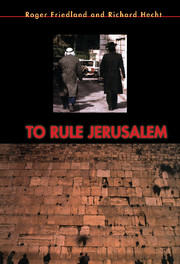Book contents
- Frontmatter
- Contents
- List of Illustrations
- Preface
- Acknowledgments
- Introduction
- 1 A Fearful Fusion
- Part I The Two Zions: Jews Against Zionism in Jerusalem
- Part II Zion Divine: Jerusalem as the Messianic Central City
- Part III Birth of a Nation
- Part IV Heart of Stone
- 16 Al-Quds and Tunis
- 17 The City That Ate Palestine
- 18 Heart of Stone
- Notes
- Index
16 - Al-Quds and Tunis
Published online by Cambridge University Press: 13 May 2010
- Frontmatter
- Contents
- List of Illustrations
- Preface
- Acknowledgments
- Introduction
- 1 A Fearful Fusion
- Part I The Two Zions: Jews Against Zionism in Jerusalem
- Part II Zion Divine: Jerusalem as the Messianic Central City
- Part III Birth of a Nation
- Part IV Heart of Stone
- 16 Al-Quds and Tunis
- 17 The City That Ate Palestine
- 18 Heart of Stone
- Notes
- Index
Summary
There has always been a tension between Palestinians inside the territories and the PLO abroad, a tug-of-war between a people and an organization claiming to speak in its name. The struggle between those who have spent their lives building a national society from their Jerusalem, al-Quds, and a grizzled war-horse who has directed a nationalist movement from Tunis was becoming increasingly acute. Organizing from Jerusalem, the Palestinians under Israeli occupation forced the PLO to make peace. But after Arafat and Rabin shook hands on the White House lawn, these Palestinians understood they would still have to fight the PLO to make the Palestine for which they had given their lives.
The PLO chose its path after the failure of another war. Iraq's defeat made Israeli-Palestinian peace a requirment of American power in the region; it also weakened the PLO sufficiently to make that peace possible. Arafat's alliance with Saddam Hussein was a disastrous move. Iraq, the Palestinians’ last, most powerful patron, was reduced in places to rubble. In Lebanon PLO militias were being systematically defanged by the Syrians. The possibility of “armed struggle” was closing down.
The war put Palestinians working in the Gulf in a precarious position. The postwar grafitti in Kuwait – “Amman, 1970; Beirut, 1982; Kuwait City, 1992” – foretold yet another Palestinian exodus. Palestinians who had worked for years in Kuwait and Saudi Arabia wanted to return to Palestine even though they knew there were no jobs waiting for them. PLO taxes on Palestinian wages and salaries would no longer be collected by these Arab states.
- Type
- Chapter
- Information
- To Rule Jerusalem , pp. 411 - 435Publisher: Cambridge University PressPrint publication year: 1996



